Tian Liang
Bottom-up Policy Optimization: Your Language Model Policy Secretly Contains Internal Policies
Dec 22, 2025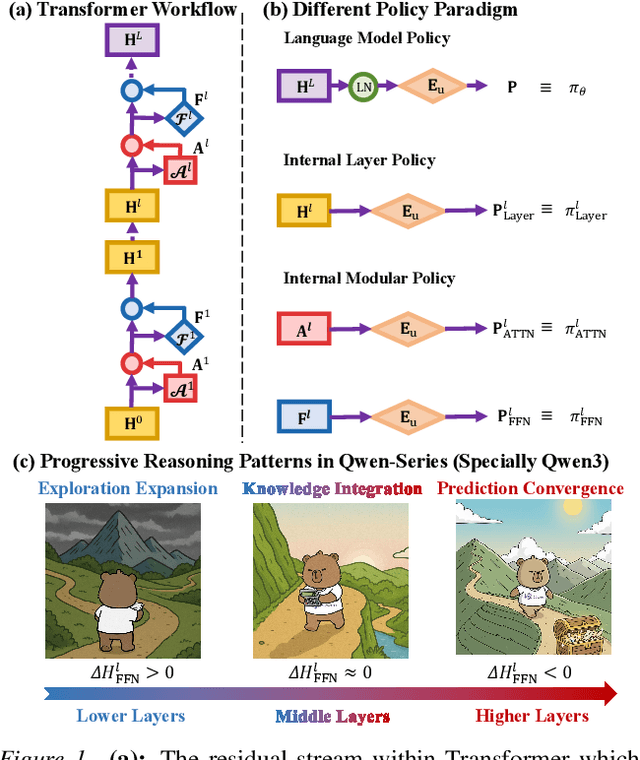
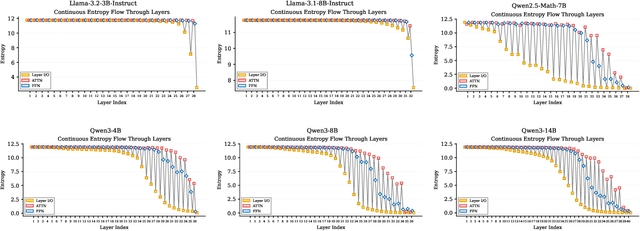
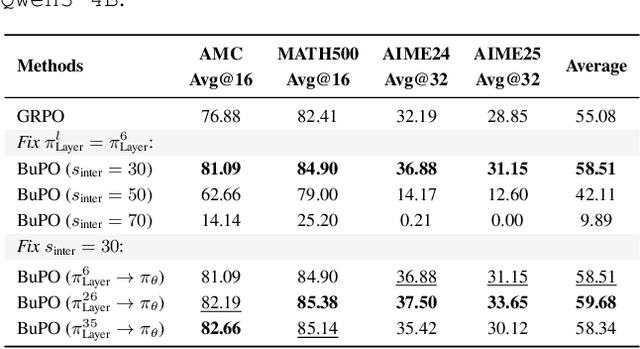
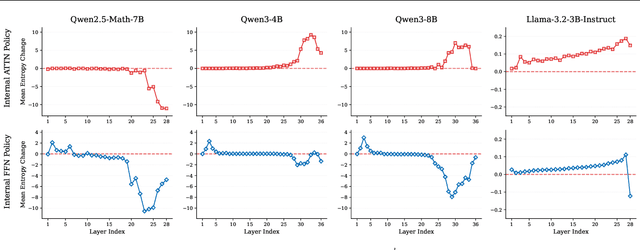
Abstract:Existing reinforcement learning (RL) approaches treat large language models (LLMs) as a single unified policy, overlooking their internal mechanisms. Understanding how policy evolves across layers and modules is therefore crucial for enabling more targeted optimization and raveling out complex reasoning mechanisms. In this paper, we decompose the language model policy by leveraging the intrinsic split of the Transformer residual stream and the equivalence between the composition of hidden states with the unembedding matrix and the resulting samplable policy. This decomposition reveals Internal Layer Policies, corresponding to contributions from individual layers, and Internal Modular Policies, which align with the self-attention and feed-forward network (FFN) components within each layer. By analyzing the entropy of internal policy, we find that: (a) Early layers keep high entropy for exploration, top layers converge to near-zero entropy for refinement, with convergence patterns varying across model series. (b) LLama's prediction space rapidly converges in the final layer, whereas Qwen-series models, especially Qwen3, exhibit a more human-like, progressively structured reasoning pattern. Motivated by these findings, we propose Bottom-up Policy Optimization (BuPO), a novel RL paradigm that directly optimizes the internal layer policy during early training. By aligning training objective at lower layer, BuPO reconstructs foundational reasoning capabilities and achieves superior performance. Extensive experiments on complex reasoning benchmarks demonstrates the effectiveness of our method. Our code is available at https://github.com/Trae1ounG/BuPO.
DeepCompress: A Dual Reward Strategy for Dynamically Exploring and Compressing Reasoning Chains
Oct 31, 2025Abstract:Large Reasoning Models (LRMs) have demonstrated impressive capabilities but suffer from cognitive inefficiencies like ``overthinking'' simple problems and ``underthinking'' complex ones. While existing methods that use supervised fine-tuning~(SFT) or reinforcement learning~(RL) with token-length rewards can improve efficiency, they often do so at the cost of accuracy. This paper introduces \textbf{DeepCompress}, a novel framework that simultaneously enhances both the accuracy and efficiency of LRMs. We challenge the prevailing approach of consistently favoring shorter reasoning paths, showing that longer responses can contain a broader range of correct solutions for difficult problems. DeepCompress employs an adaptive length reward mechanism that dynamically classifies problems as ``Simple'' or ``Hard'' in real-time based on the model's evolving capability. It encourages shorter, more efficient reasoning for ``Simple'' problems while promoting longer, more exploratory thought chains for ``Hard'' problems. This dual-reward strategy enables the model to autonomously adjust its Chain-of-Thought (CoT) length, compressing reasoning for well-mastered problems and extending it for those it finds challenging. Experimental results on challenging mathematical benchmarks show that DeepCompress consistently outperforms baseline methods, achieving superior accuracy while significantly improving token efficiency.
DeepTheorem: Advancing LLM Reasoning for Theorem Proving Through Natural Language and Reinforcement Learning
May 29, 2025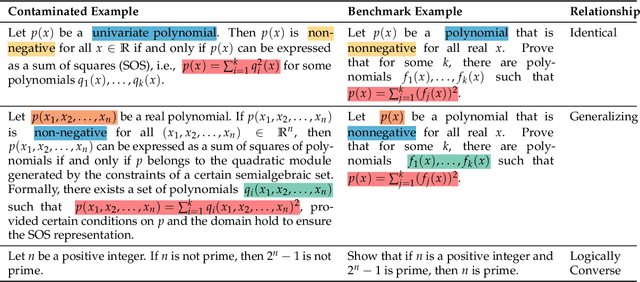
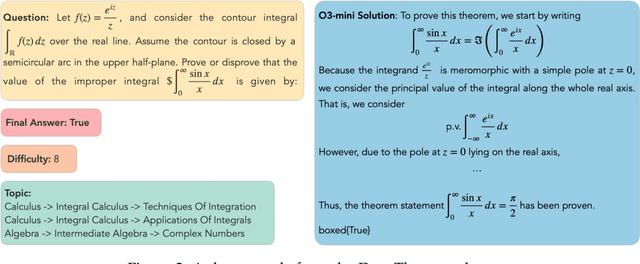
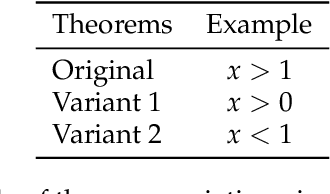
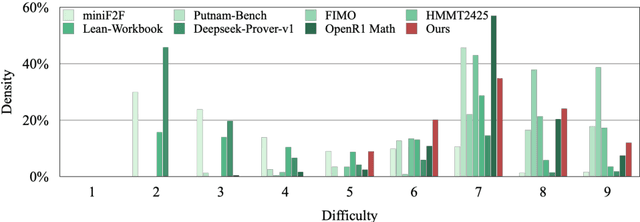
Abstract:Theorem proving serves as a major testbed for evaluating complex reasoning abilities in large language models (LLMs). However, traditional automated theorem proving (ATP) approaches rely heavily on formal proof systems that poorly align with LLMs' strength derived from informal, natural language knowledge acquired during pre-training. In this work, we propose DeepTheorem, a comprehensive informal theorem-proving framework exploiting natural language to enhance LLM mathematical reasoning. DeepTheorem includes a large-scale benchmark dataset consisting of 121K high-quality IMO-level informal theorems and proofs spanning diverse mathematical domains, rigorously annotated for correctness, difficulty, and topic categories, accompanied by systematically constructed verifiable theorem variants. We devise a novel reinforcement learning strategy (RL-Zero) explicitly tailored to informal theorem proving, leveraging the verified theorem variants to incentivize robust mathematical inference. Additionally, we propose comprehensive outcome and process evaluation metrics examining proof correctness and the quality of reasoning steps. Extensive experimental analyses demonstrate DeepTheorem significantly improves LLM theorem-proving performance compared to existing datasets and supervised fine-tuning protocols, achieving state-of-the-art accuracy and reasoning quality. Our findings highlight DeepTheorem's potential to fundamentally advance automated informal theorem proving and mathematical exploration.
Two Experts Are All You Need for Steering Thinking: Reinforcing Cognitive Effort in MoE Reasoning Models Without Additional Training
May 20, 2025Abstract:Mixture-of-Experts (MoE) architectures within Large Reasoning Models (LRMs) have achieved impressive reasoning capabilities by selectively activating experts to facilitate structured cognitive processes. Despite notable advances, existing reasoning models often suffer from cognitive inefficiencies like overthinking and underthinking. To address these limitations, we introduce a novel inference-time steering methodology called Reinforcing Cognitive Experts (RICE), designed to improve reasoning performance without additional training or complex heuristics. Leveraging normalized Pointwise Mutual Information (nPMI), we systematically identify specialized experts, termed ''cognitive experts'' that orchestrate meta-level reasoning operations characterized by tokens like ''<think>''. Empirical evaluations with leading MoE-based LRMs (DeepSeek-R1 and Qwen3-235B) on rigorous quantitative and scientific reasoning benchmarks demonstrate noticeable and consistent improvements in reasoning accuracy, cognitive efficiency, and cross-domain generalization. Crucially, our lightweight approach substantially outperforms prevalent reasoning-steering techniques, such as prompt design and decoding constraints, while preserving the model's general instruction-following skills. These results highlight reinforcing cognitive experts as a promising, practical, and interpretable direction to enhance cognitive efficiency within advanced reasoning models.
Trust, But Verify: A Self-Verification Approach to Reinforcement Learning with Verifiable Rewards
May 19, 2025Abstract:Large Language Models (LLMs) show great promise in complex reasoning, with Reinforcement Learning with Verifiable Rewards (RLVR) being a key enhancement strategy. However, a prevalent issue is ``superficial self-reflection'', where models fail to robustly verify their own outputs. We introduce RISE (Reinforcing Reasoning with Self-Verification), a novel online RL framework designed to tackle this. RISE explicitly and simultaneously trains an LLM to improve both its problem-solving and self-verification abilities within a single, integrated RL process. The core mechanism involves leveraging verifiable rewards from an outcome verifier to provide on-the-fly feedback for both solution generation and self-verification tasks. In each iteration, the model generates solutions, then critiques its own on-policy generated solutions, with both trajectories contributing to the policy update. Extensive experiments on diverse mathematical reasoning benchmarks show that RISE consistently improves model's problem-solving accuracy while concurrently fostering strong self-verification skills. Our analyses highlight the advantages of online verification and the benefits of increased verification compute. Additionally, RISE models exhibit more frequent and accurate self-verification behaviors during reasoning. These advantages reinforce RISE as a flexible and effective path towards developing more robust and self-aware reasoners.
DeepMath-103K: A Large-Scale, Challenging, Decontaminated, and Verifiable Mathematical Dataset for Advancing Reasoning
Apr 15, 2025



Abstract:The capacity for complex mathematical reasoning is a key benchmark for artificial intelligence. While reinforcement learning (RL) applied to LLMs shows promise, progress is significantly hindered by the lack of large-scale training data that is sufficiently challenging, possesses verifiable answer formats suitable for RL, and is free from contamination with evaluation benchmarks. To address these limitations, we introduce DeepMath-103K, a new, large-scale dataset comprising approximately 103K mathematical problems, specifically designed to train advanced reasoning models via RL. DeepMath-103K is curated through a rigorous pipeline involving source analysis, stringent decontamination against numerous benchmarks, and filtering for high difficulty (primarily Levels 5-9), significantly exceeding existing open resources in challenge. Each problem includes a verifiable final answer, enabling rule-based RL, and three distinct R1-generated solutions suitable for diverse training paradigms like supervised fine-tuning or distillation. Spanning a wide range of mathematical topics, DeepMath-103K promotes the development of generalizable reasoning. We demonstrate that models trained on DeepMath-103K achieve significant improvements on challenging mathematical benchmarks, validating its effectiveness. We release DeepMath-103K publicly to facilitate community progress in building more capable AI reasoning systems: https://github.com/zwhe99/DeepMath.
Dancing with Critiques: Enhancing LLM Reasoning with Stepwise Natural Language Self-Critique
Mar 21, 2025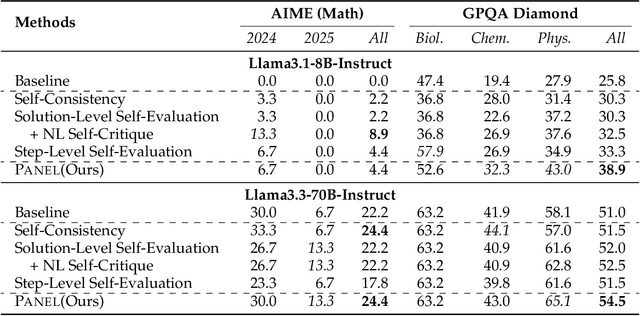

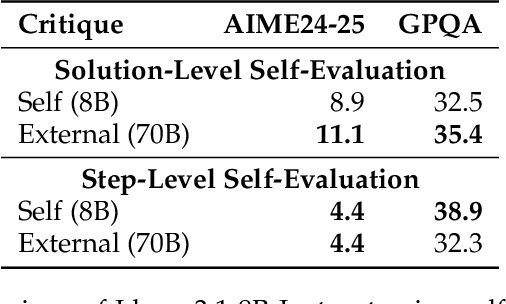

Abstract:Enhancing the reasoning capabilities of large language models (LLMs), particularly for complex tasks requiring multi-step logical deductions, remains a significant challenge. Traditional inference time scaling methods utilize scalar reward signals from process reward models to evaluate candidate reasoning steps, but these scalar rewards lack the nuanced qualitative information essential for understanding and justifying each step. In this paper, we propose a novel inference-time scaling approach -- stepwise natural language self-critique (PANEL), which employs self-generated natural language critiques as feedback to guide the step-level search process. By generating rich, human-readable critiques for each candidate reasoning step, PANEL retains essential qualitative information, facilitating better-informed decision-making during inference. This approach bypasses the need for task-specific verifiers and the associated training overhead, making it broadly applicable across diverse tasks. Experimental results on challenging reasoning benchmarks, including AIME and GPQA, demonstrate that PANEL significantly enhances reasoning performance, outperforming traditional scalar reward-based methods. Our code is available at https://github.com/puddingyeah/PANEL to support and encourage future research in this promising field.
RaSA: Rank-Sharing Low-Rank Adaptation
Mar 16, 2025Abstract:Low-rank adaptation (LoRA) has been prominently employed for parameter-efficient fine-tuning of large language models (LLMs). However, the limited expressive capacity of LoRA, stemming from the low-rank constraint, has been recognized as a bottleneck, particularly in rigorous tasks like code generation and mathematical reasoning. To address this limitation, we introduce Rank-Sharing Low-Rank Adaptation (RaSA), an innovative extension that enhances the expressive capacity of LoRA by leveraging partial rank sharing across layers. By forming a shared rank pool and applying layer-specific weighting, RaSA effectively increases the number of ranks without augmenting parameter overhead. Our theoretically grounded and empirically validated approach demonstrates that RaSA not only maintains the core advantages of LoRA but also significantly boosts performance in challenging code and math tasks. Code, data and scripts are available at: https://github.com/zwhe99/RaSA.
The First Few Tokens Are All You Need: An Efficient and Effective Unsupervised Prefix Fine-Tuning Method for Reasoning Models
Mar 04, 2025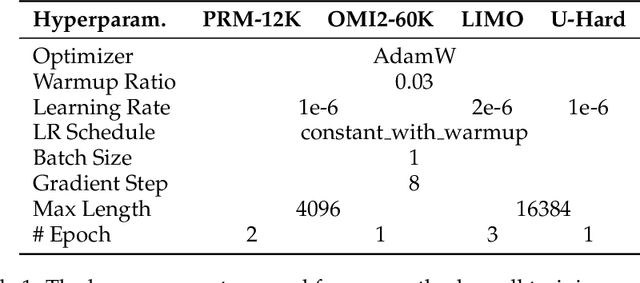
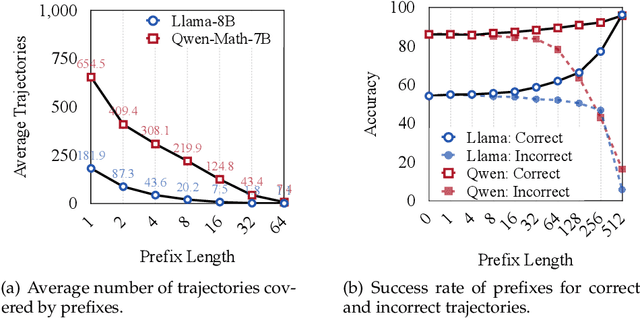
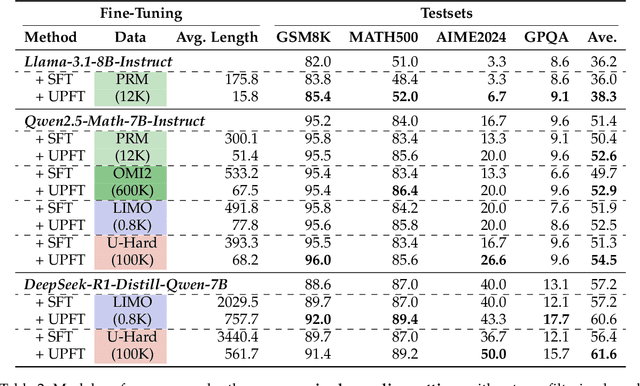

Abstract:Improving the reasoning capabilities of large language models (LLMs) typically requires supervised fine-tuning with labeled data or computationally expensive sampling. We introduce Unsupervised Prefix Fine-Tuning (UPFT), which leverages the observation of Prefix Self-Consistency -- the shared initial reasoning steps across diverse solution trajectories -- to enhance LLM reasoning efficiency. By training exclusively on the initial prefix substrings (as few as 8 tokens), UPFT removes the need for labeled data or exhaustive sampling. Experiments on reasoning benchmarks show that UPFT matches the performance of supervised methods such as Rejection Sampling Fine-Tuning, while reducing training time by 75% and sampling cost by 99%. Further analysis reveals that errors tend to appear in later stages of the reasoning process and that prefix-based training preserves the model's structural knowledge. This work demonstrates how minimal unsupervised fine-tuning can unlock substantial reasoning gains in LLMs, offering a scalable and resource-efficient alternative to conventional approaches.
Thoughts Are All Over the Place: On the Underthinking of o1-Like LLMs
Jan 30, 2025



Abstract:Large language models (LLMs) such as OpenAI's o1 have demonstrated remarkable abilities in complex reasoning tasks by scaling test-time compute and exhibiting human-like deep thinking. However, we identify a phenomenon we term underthinking, where o1-like LLMs frequently switch between different reasoning thoughts without sufficiently exploring promising paths to reach a correct solution. This behavior leads to inadequate depth of reasoning and decreased performance, particularly on challenging mathematical problems. To systematically analyze this issue, we conduct experiments on three challenging test sets and two representative open-source o1-like models, revealing that frequent thought switching correlates with incorrect responses. We introduce a novel metric to quantify underthinking by measuring token efficiency in incorrect answers. To address underthinking, we propose a decoding strategy with thought switching penalty TIP that discourages premature transitions between thoughts, encouraging deeper exploration of each reasoning path. Experimental results demonstrate that our approach improves accuracy across challenging datasets without requiring model fine-tuning. Our findings contribute to understanding reasoning inefficiencies in o1-like LLMs and offer a practical solution to enhance their problem-solving capabilities.
 Add to Chrome
Add to Chrome Add to Firefox
Add to Firefox Add to Edge
Add to Edge